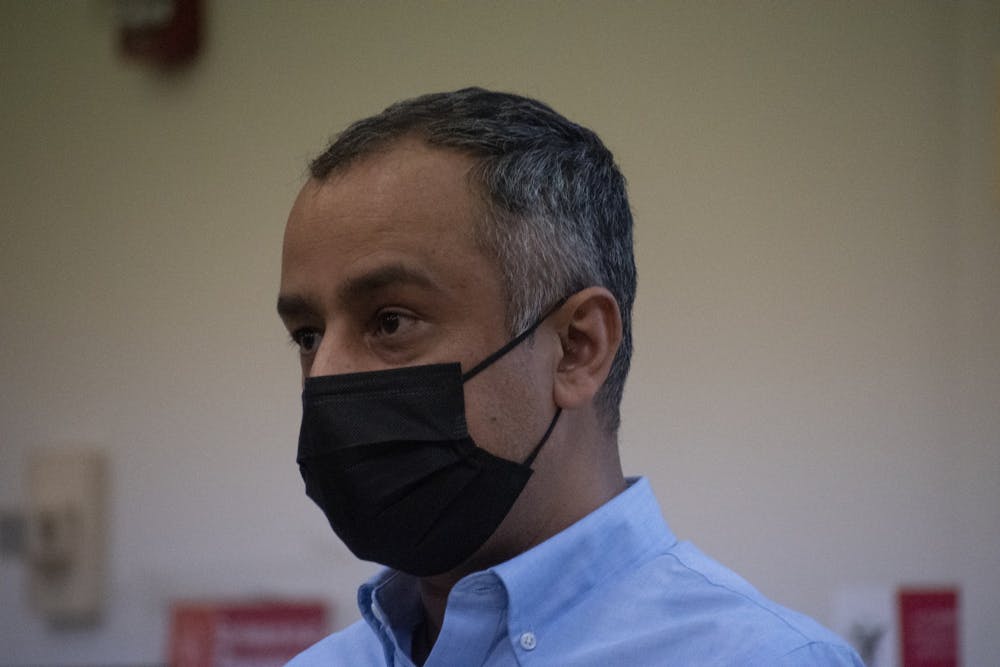Students gathered in the Burkhardt Building Oct. 20 to attend a lecture by 2014 Ball State alumnus Qais Faqiri. The lecture, titled “Centralization of Power and the Collapse of Afghanistan,” was hosted by the Global Studies Association (GSA) and focused on the history of Afghanistan leading up to the evacuation of U.S. troops Aug. 30, as well as Faqiri’s own flight from the country Aug. 23.
Born in Afghanistan, Faqiri came to the United States as a Fulbright Scholar in 2007, receiving his undergraduate degree in journalism at Ball State. After his graduation in 2010, he moved to North Carolina to help train U.S. marines after former President Barack Obama ordered a troop surge in Afghanistan in 2009. Over the next few years, Faqiri worked as an international broadcaster for Voice of America in Washington, D.C., and helped translate detainee profiles at Bagram Air Base in Bagram, Afghanistan.
In 2013, Faqiri returned to Ball State to pursue a master’s degree in political science.
“I saved some money, came back to Ball State and started my graduate [degree in political science],” Faqiri said. “I was always fascinated with politics, and, back then, I thought I would go for a PhD — but right now I don’t.”
Faqiri received his U.S. citizenship in 2016, after which he went back to Afghanistan to work with the U.S. Agency for International Development to manage university partnerships between Afghan and American universities. Through this program, Ball State has developed partnerships with Shaikh Zayed University in Khost, Afghanistan, and Kandahar University in Kandahar, Afghanistan.
After another brief stint in the U.S., Faqiri again left the country to work as director of cultural affairs in Koggala, Sri Lanka, managing sports teams, theaters, musicians and other members of the city’s art scene. However, in a starkly contrasting image, Faqiri juxtaposed his position at the time with the unrest in Afghanistan today.
“I just learned that one of my female volleyball players was beheaded by the Taliban — I just learned yesterday,” Faqiri said. “So, every day, I get news.”
Faqiri spoke at length about the modern history of Afghanistan, from its independence in 1919 to the Sept. 11, 2001, attacks and the subsequent U.S. invasion of the country shortly thereafter.
After experiencing four regime changes in Afghanistan throughout his life, Faqiri is not optimistic about the future of the country in this new era of Taliban control.
“The immediate future is bleak,” Faqiri said. “That’s why a lot of people are leaving the country and taking whatever money they have.”
Mamed Ramazanli, junior political science and economics major and president of GSA, said he thinks these sorts of lectures are particularly important for students.
“It’s a major source of enrichment,” Ramanzanli said. “It’s one thing hearing something from a professor and another thing [to hear] something from a speaker who actually went through it.”
Throughout the lecture, Faqiri made a point to repeatedly touch on what he saw as a recurring history of undemocratic practices in even the most democratic Afghan regimes — with the “centralization of power” mentioned in the title of the lecture also pointing this motif.
“A democracy works as long as you trust that it works,” Faqiri said. “The moment you start losing trust, democracy doesn’t work — it’s just given.”
Contact Joey Sills with comments at joey.sills@bsu.edu or on Twitter @sillsjoey.





